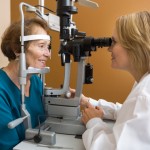Computer vision syndrome: Smart tips to beat smartphone stress
 You get up in the morning and check your email, the latest news and the weather forecast. Then you spend your day on and off your smartphone and computer, and make time to relax in front of the TV. Well, all that screen time is taking a toll on your eyes.
You get up in the morning and check your email, the latest news and the weather forecast. Then you spend your day on and off your smartphone and computer, and make time to relax in front of the TV. Well, all that screen time is taking a toll on your eyes.
The new epidemic in America? Computer vision syndrome (CVS). This is not one specific eye problem, but a whole range of eye strain and pain experienced by computer users. Working adults aren’t the only ones vulnerable to the effect of computers on eye health and computer vision syndrome long-term effects. Adults who spend a lot of time on their smartphones or computers for information, hobbies or social media are also at risk.
And the next generation kids who are relentless about staring non-stop at portable video games – you’ve seen these kids! – or who use computers throughout the day at school also can experience eye damage from computer screens. The problem is aggravated when the lighting and computer position are less than ideal.
Computer vision syndrome: Know your risk
 If there is a fair amount of screen time in your life, you’re likely at risk for pc eye strain and computer vision syndrome long-term effects. Our eyes just weren’t made for hours of computer use, day-in, day-out. The American Optometric Association estimates there are more than 10 million visits to eye doctors every year for computer vision syndrome related problems.
If there is a fair amount of screen time in your life, you’re likely at risk for pc eye strain and computer vision syndrome long-term effects. Our eyes just weren’t made for hours of computer use, day-in, day-out. The American Optometric Association estimates there are more than 10 million visits to eye doctors every year for computer vision syndrome related problems.
If you spend more than two hours daily in front of a computer screen – be honest here – you have a 90 percent chance to develop CVS. Experts suggest without proper vision correction, worker productivity can decrease by as much as 20 percent. Computer eye strain is the first computer related complaint. Our health issues, including those for our eyes, have repercussions not only on our individual careers, but the economy in general. If our workforce is primarily knowledge-based (and that means a lot of computer time), computer vision syndrome long-term effects are a very real and present danger.
Computer vision syndrome: Causes
Why does starting at screens jeopardize our eye health? They require the eyes to continuously focus, move back and forth, and align with what you are seeing. Your eyes, whether you realize it or not, are working hard. If you look down at papers and then back up to type, there’s more effort. Your eyes have to accommodate changing images on the screen, or rapid-fire text messages, to create a clear picture for the brain to interpret.
This is challenging for eye muscles. Unlike a book or paper, a computer screen means your eyes have to deal with screen contrast, flicker and glare. Add to the mix, if you already have an eye problem, such as nearsightedness or astigmatism, or wear the wrong eye glass prescription for computer use, you’re more likely to experience the negative effect of computers on eye health.
As you age, computer work is even harder on your eyes because the lens of your eye is less flexible. Your ability to focus on near and far objects starts to diminish around age 40, which is why computer vision syndrome prevention is so important.
Computer vision syndrome: Signs and symptoms
Computer vision syndrome long-term effects do not cause vision loss or cataracts. However, regular screen use will cause serious eye strain, discomfort and loss of productivity. You and your eyes will “burn out” if you don’t take steps computer vision syndrome prevention. If you have computer vision syndrome, you may experience some or all of these symptoms:
- Blurred vision
- Double vision
- Dry, red eyes
- Eye irritation
- Headaches
- Neck, shoulder or back pain
- Fatigue.
Simple tips to avoid computer vision syndrome
 Make computer eye strain relief a priority to protect your eyes. Here are key tips from the Mayo Clinic to put into practice:
Make computer eye strain relief a priority to protect your eyes. Here are key tips from the Mayo Clinic to put into practice:
Blink more often. Blinking is a natural way our bodies refresh our eyes. Most of us, though, blink less than normal when we’re working at a computer or on our smartphone. We end up with dry, tired irritated eyes. Blinking produces tears that moisten and refresh your eyes. So you need to make a conscious effort to blink more often.
Take eye breaks. Before your eyes decide to go on strike (and leave you with all those ill symptoms), give your eyes a break by forcing them to focus on something other than on your screen. Follow the 20-20-20 rule: Every 20 minutes, take your eyes off your computer and look at something 20 feet away for at least 20 seconds. Moving your body helps, too: Get up and move around at least once every hour. Another trick is to lean back and close your eyes for a few moments.
Try self-massage. Massage your eyelids and muscles over your brow, temple and upper cheek once or twice daily. Use your bare hands and fingers or a warm towel over closed eyes. Why? This can stimulate your tear glands to help prevent dry eyes. Massaging the muscles in the area around your eye also helps relax those muscles, which may reduce some of the symptoms of eye strain.
Check the lighting and reduce glare. Bright lighting and too much glare can put a strain your eyes and make it difficult to see objects on your screen. Sit at your computer with the monitor off to check the glare factor. The worst problems are from sources above or behind you, including fluorescent lighting and sunlight.
Consider using artificial teardrops. Over-the-counter artificial tears can help prevent and relieve dry eyes that result from prolonged sessions at the computer. Lubricating drops that don’t contain preservatives can be used as often as you need. If the drops you’re using drops that contain preservatives, don’t use them more than four times a day.
Practice relaxation. Ease muscle tension with relaxation exercises. Place your elbows on your desk, palms facing up. Let your weight fall forward and your head fall into your hands. Position your head so that your hands cover your eyes, with your fingers extended toward your forehead. Close your eyes and take a deep breath through your nose; hold it for four seconds, then exhale. Continue this deep breathing for 15 to 30 seconds. Repeat several times a day and make it a habit!
Get the right eyewear. If you wear glasses or contacts, make sure the correction is right for computer work – most lenses are fitted for reading print, not screens. Glasses or contact lenses designed specifically for computer work may be a worthwhile investment.
Computer vision syndrome can be avoided with these simple tips to consciously make screen time easier on the eyes. If you can cut back a little and get outdoors for a quick walk to break up your day, even better! Good lifestyle habits, too, like healthy eating and regular exercise will give your eyes a boost as well.
So keep everything in moderation – including those late-night video game sessions!
-
Nettles: The Weight Loss Super Food
Stinging nettles, much like its equally misunderstood friend the da
-
Diet Are French Fries Really A Vegetable
The government, nutritionists, doctors, and dietitians implore us to e
-
Weight Fluctuations Explained
When you experience weight fluctuations, it is natural that you will
-
Benefit of Power foods
Today almost every individual is having hectic lifestyle and poor e
-
Child Obesity
Fix Child Obesity From Home... Im sorry, but is it really that big
-
Hcg For Weight Loss
HCG weight loss program is one of the most admired and credible way o
- DON'T MISS
- How to Lose Weight in 2 Weeks - What You Should Know
- Nutritious Fat Burning Foods Are Vital to Your Healthy Weight reduction Diet
- 5 Tips For Weight Loss
- 3 Factors For Healthy Weight Loss
- Hydroxycut Side Effects: Can You Lose Weight Fast using Hydroxycut, Without any Side Effects?
- How To Lose That 10 Lbs Just Before Your Vacation
- Rapid Diet Plan To Natural Lose Weight
- Halloween Calories – Ways To Avoid Packing on Extra Pounds
- Weight Loss Secrets You Have to Know About
- Simple And Effective Workouts For Love Handles Elimination




